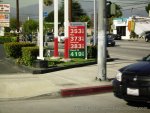Here are a couple of thoughts:
First it is interesting to note where our petrol come from; you might see a few surprises:
http://www.eia.doe.gov/pub/oil_gas/...ons/company_level_imports/current/import.html
I think the price of Diesel has to do mostly with the economic concept of price elasticity - which is to say, how does a change in price affect demand for the fuel?
In the case of gasoline consumers are now at the point where they are looking for ways to conserve. Any further increase in price will result in consumers burning less fuel, and thus, a decrease in revenue for the energy industry. (People will drive less, carpool, mass transit, etc.)
Demand for Diesel is less elastic - the demand stays the same regardless of price since Diesel fuels the movement of commercial goods. It does not matter how much the price is - the trucks still need to roll with the consumable goods. The price increase is merely passed on to the end user (eventually.)
On the subject of taxes: I wish there was a chart on the pump with the price/gallon broken out by crude cost, refinement cost, and taxes assessed.
OK . . . I'll take off my M.B.A. hat now and get back to sanding, priming and painting the truck.
P.S. PLEASE do not forward (or believe) emails that suggest boycotting a certain brand, or alternating purchasing intervals, etc. will lower prices . . . . these schemes that are passed around the internet would actually cause an INCREASE in prices! The only viable way to lover fuel prices is to A. increase the supply of fuel, or B. burn less.



